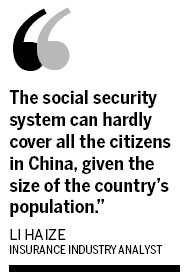Health system to get shot in the arm
Updated: 2011-11-30 07:22
By Shan Juan (China Daily)
|
|||||||||
BEIJING - China is set to progressively promote commercial health insurance programs as the country appears to be more determined to tap all resources available to strive for universal and affordable healthcare for its citizens.
Vice-Premier Li Keqiang made the remarks on Tuesday while addressing a State Council meeting on deepening the ongoing healthcare reform in China.
 |
To date, more than 1.28 billion Chinese people are covered by basic medical insurance programs run by the government, accounting for nearly 96 percent of the population, according to the latest statistics from the Ministry of Health.
Recognizing that the current round of healthcare reform has made huge progress, Li called for deepening healthcare reform in the coming five years to build a system that benefits the entire population.
"As the healthcare reform deepens, more tough challenges and difficulties can be expected. But the reform has to be continued to improve health equality and to better meet rising healthcare demands from the public," he said.
In April 2009, the central government accelerated its healthcare reform by unveiling a three-year roadmap with an investment of at least 850 billion yuan ($133 billion) to provide fair, affordable and quality healthcare services for the public.
Major reform measures include expanding the healthcare insurance umbrella, public hospital reform, establishing an essential drug system and improving health equality.
Apart from investment by the government, social resources have to be further tapped to achieve that, said Liu Guo'en, a health policy researcher with Peking University.
"The government will try its best to support the healthcare industry but the investment should also be based on the economic situation of the country," Li said.
China's total healthcare expenditure in 2010 reached about 2 trillion yuan, or about 1,400 yuan per capita, official statistics said.
Meanwhile, government subsidies amounted to 120 yuan per person.
"The government is only able to cover a very small share of the medical bills," said Vice-Minister of Health Huang Jiefu.
Private health insurance programs will be largely promoted to help with the country's healthcare financing that is now mainly shouldered by the government, Li said.
Lin Yaomin, president of Kunlun Health Insurance, said as a practitioner he highly welcomed the initiative.
"That'll be a boost for the industry and I feel very encouraged."
According to Lin, less than 2 percent of the country's healthcare financing is currently shouldered by private medical insurance policies while the figure stands at around 20 percent in foreign countries.
"The latest initiative is more in line with international practice," he said.
Meanwhile, Lin urged the government to issue matching policies to help with the implementation.
For instance, employers who purchase private medical programs for their employees should be encouraged with measures like tax reductions, he noted.
Also, the public should be better informed that free medical care barely exists and no government worldwide could do that, he said.
Li Haize, an insurance industry analyst with a Shanghai-based securities company, said promoting commercial health insurance can help further raise the country's healthcare coverage.
"The social security system can hardly cover all the citizens in China, given the size of the country's population. Private insurance can stand as a backup to the social security system," said Li.
According to Vice-Premier Li Keqiang, in the 12th Five-Year Plan (2011-2015) period social capital will be encouraged to invest into the medical industry, particularly in non-basic healthcare sectors, and help construct a healthcare service network that could satisfy the health demands of various levels.
"Building up an environment that respects fair competition in the industry should be put high on the government agenda," said Huang Jiefu.
Hu Yuanyuan and Gao Changxin contributed to this story.











